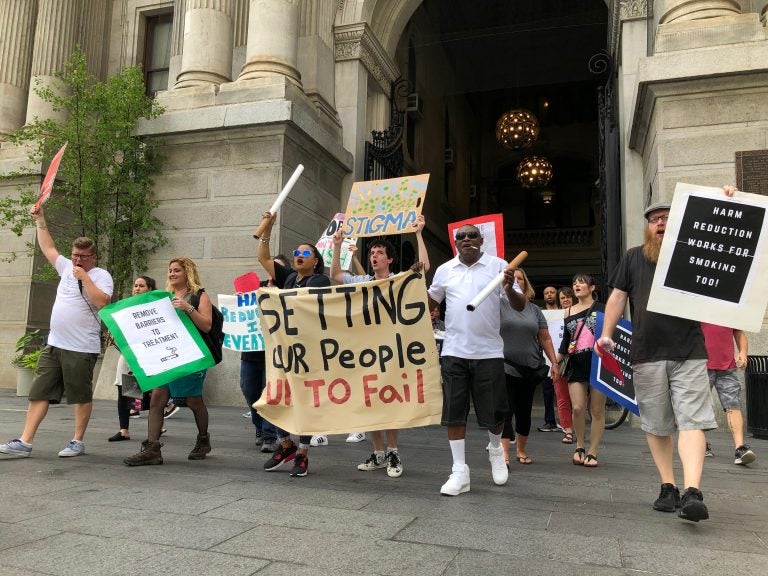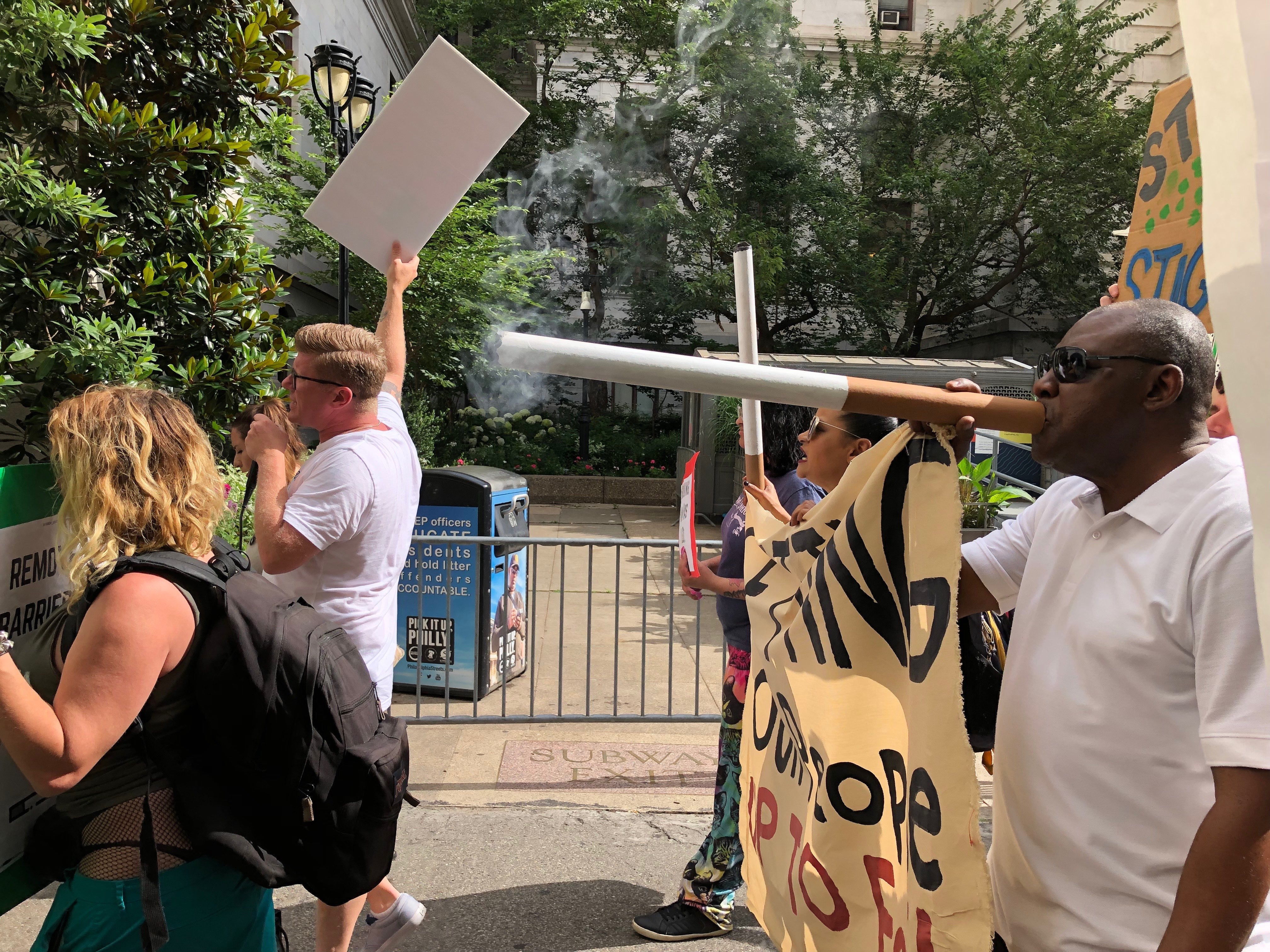Philly health officials, advocates split on impact of smoking ban at inpatient rehabs
Six months in, opponents say a smoking ban at Philadelphia inpatient addiction treatment centers is a barrier to getting started for some. Others leave early.

Protesters gathered at city hall opposing the city's smoking ban in inpatient addiction treatment facilities (Nina Feldman/WHYY)
Protesters marched down Market Street Tuesday to demand that Philadelphia’s Department of Behavioral Health end its ban on smoking cigarettes at inpatient addiction-treatment facilities.
The protesters say the ban dissuades people from entering treatment if they can’t smoke inside. They also say it makes people more likely to leave treatment early against medical advice and is causing people to get kicked out of treatment.
Brooke Feldman, who is in long-term recovery and works as a social worker at an outpatient treatment center, organized the protest. At a time when Philadelphia is experiencing unprecedented overdose numbers, she said, the city’s addiction treatment centers need to meet people where they are.
“If someone says, ‘Look, I want to stop shooting dope, but I’m not ready to quit smoking cigarettes and I’m not going to go to treatment if you force me to do that, then they should have options available,” said Feldman.
But officials at the Department of Behavioral Health and Intellectual Disability say they are trying to shift the recovery paradigm from one that is responding to individual episodes to one that is addressing the root cause of addiction. To do that, said DBHIdS spokesman Joel Avery, a treatment facility can’t address one addiction and not another.
“What would you think if the system had an individual that was addicted to cocaine and heroin, and only treated the heroin addiction?” he asked.
“We’re talking about engaging people in a way of life, an approach, a culture that helps them to address their addiction,” added the department’s deputy commissioner, Roland Lamb. “Our addictive behaviors don’t just center around one thing — we need to begin to stop with this hierarchy of drugs, so to speak.”
More than 1,100 people died of drug overdoses in Philadelphia last year. Tobacco is responsible for nearly four times that number of deaths annually, and people struggling with substance use disorder smoke at three times the rate of those who don’t. The new policy is based on research funded by the National Institute on Drug Abuse that found that people in recovery who continue to smoke have a higher risk for relapse.
Considering those factors, officials said it would be irresponsible to allow people in treatment facilities to continue to smoke there — and that someone who wants to keep smoking is, in a sense, not taking recovery seriously.
“If you’re telling me that you don’t want to stop smoking, you’re telling me that you’re willing to jeopardize any success that we have at treatment,” said Lamb.
Opponents of the ban say that attitude ignores the very principle of harm reduction and successful treatment: meeting people where they are.
“If I hadn’t been allowed to smoke during my time in treatment, I don’t know if I would have made it through,” said Michael Worthy, who attended the protest with a giant, hollow cardboard cigarette through which he blew real cigarette smoke.

“If you’re taking away the drug aspect of almost a lifetime, it has to be replaced with something,” said Worthy, who has been in recovery for 10 years. “If you don’t give me an avenue to be able to smoke, I won’t have a comfort place.”
State Rep. Joe Hohenstein, who represents the city’s Fairhill neighborhood, also opposes the ban.
“If you’re going to be saying to people, ‘If you come in, we’re taking you off of everything,’ that can lead to some people just saying, ‘Nope, forget it, I’m out of here.’ That’s the last thing that we want. What we want is more people saying, ‘Yes, get me into treatment, get me moving.”
Hohenstein said he would have been at the protest if he hadn’t been in Harrisburg for the day.
The smoking ban has been in place since January. The best way to determine whether the policy has indeed resulted in people leaving treatment early is to analyze the rates of patients leaving treatment against medical advice before and after the ban. Officials from DBHIdS said that those rates have remained stable at about 20% since 2015, “with no significant upward or downward impact to this trend from the recently enacted tobacco-free policy.”
In response to the claim that the policy deters people from entering treatment in the first place, the department reported that 2,890 individuals utilized the city’s inpatient drug treatment services in the first quarter of 2019, an increase of 18.8% when compared to the same period last year.
The department would not share with WHYY News month-by-month or quarterly breakdowns of “against medical advice” (AMA) rates, or facility-specific statistics.
Brooke Feldman said she and others were told in a meeting with the leadership of Community Behavioral Health, the nonprofit that runs the city’s Medicaid-funded mental health and substance use programs, that AMA numbers had indeed gone up in the first quarter of 2019.
And several supervisors at inpatient treatment facilities told WHYY News that AMA numbers have been up in the past months. Laura Boston Jones, vice president for Behavioral Health Services at North Philadelphia Health System, said she estimated the rate had doubled, but did not attribute the rise to the smoking ban.
Another supervisor, who spoke on the condition of anonymity out of fear of being fired for speaking out against the policy, was confident AMA numbers had gone up at their facility. They were also confident administrative discharges had increased, for which the department did not release data.
“People are coming to treatment, and we are kicking them out, often to homelessness and largely to relapse, because of this rule,” said the supervisor.
Last week, Community Behavioral Health issued guidance to providers, urging them not to kick people out for smoking but to work with them instead.
Still, the supervisor said, providers that rely on CBH for funding don’t want to risk being out of compliance. “It’s very complicated as a supervisor, identifying as a harm reductionist and having to carry out these policies that we don’t agree with in a time like this.”
Feldman and the protesters said they plan to continue applying pressure on CBH and DBHidS officials. They are working to gain support from City Council members and the District Attorney’s Office and have filed a complaint with the ACLU.
One protester, Ronnie Sue Kaiser, has been in recovery for 24 years. She quit smoking on her own, years after she stopped using drugs, and said she thought it was simply unrealistic to ask anyone to drop everything at once.
“Everyone should quit smoking, I agree with that,” she said. “But you can’t force people when they’re at their worst. You just can’t.”
WHYY is your source for fact-based, in-depth journalism and information. As a nonprofit organization, we rely on financial support from readers like you. Please give today.





